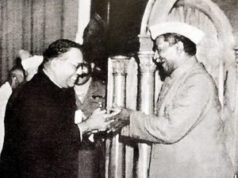The state governors of India, a product of a time long-past, have been under the scrutiny of the public eye for a long time now. Yet, despite their notorious reputations, little seems to have been done.
The colonial origins of the Governor’s position lie in the Government of India Act 1935, which although gave over the provincial governments to Indians, allowed retention of British control via nomination of the Governor who was to be the titular head of these provincial governments. Although the move was met with indignance by the Congress, the opposition soon turned into active endorsement when the latter replaced our colonial masters at the Centre. The unelected Governor, who once preserved the interests of their colonial friends, now preserves the interests of the ruling party. Prone to dismissal and replacement without explanation, the highly decorated post of the Governor holds little independent power and in reality exists to do the Federal Govt’s bidding. An example on this being the UPA government’s arbitrary dismissal of 4 governors back in 2013.
And so, the public debate on the symbolism of the Governor’s position is not unwarranted. Some could say it was doomed from the very beginning, afterall, a colonial legacy such as that accompanying the Governorship is hard to ignore, and even harder to mend.
Modern times have only underscored the complicated relationship between the Governor and various political parties. The governor’s unrepresentative presence, wherein there is no accountability to the state legislature she or he presides over, renders the position vulnerable to abuse by the party in power at the centre. Conversely, the precariousness of the position allows state governments to needlessly attack the ruling party and argue against any step taken by the governor- even when they’re justified.
In states where the leadership is not the same as the one at the centre, the whole government is at the mercy of an unelected official who can, at any time, disband the state government citing “constitutional breakdown”. Case in point: AAP government in Delhi and its constant run ins with the Lieutenant Governor of Delhi (who served under the Atal Bihari Vajpayee government). In states where the leadership is the same as the ruling party, there is no incentive for the Governor to carry out its duties in the event that there is an actual “constitutional breakdown”. Either ways, parties can override, or abuse the office of the Governor with impunity.
Additionally, the discretionary powers awarded to the Governor lack any system of checks and balances. They have often come under fire for being undemocratic- not only by virtue of the unelected official wielding them but also for the lack of inputs by the state government. For example, among the two main discretionary powers given to the Governor, one gives him/her the power to decide which party forms the government and/or proves their majority in case there is no clear majority post-elections. This also, by extension, gives the official powers to decide what is the process to be observed. This arbitrary power, devoid of any codified precedence, if used with party bias (which it often is) or malicious intent could distort and compromise the results of the elections themselves.
For example, the duration allowed to any party to prove their majority demands absolute delicacy considering that bribing and poaching other party members is not too far a reality. In this case, each minute counts! To then put the matter of upholding the integrity of the elections in the Governor’s unaccounted- for hands, and demand they view their political affiliations with objectivity, is to risk the very fabric of democracy.
The most essential bias in this case is a concept that the Indian bureaucracy is only too well-versed in. Plush government offices, dangled as post-retirement carrots to award loyalty in crucial times is a much practised tradition in our political space. Nomination for the Governorship is one such sought after seat. In light of this carrot and stick issue that has dominated the administrative services, to assume that the Governor would have incentive to carry out the office’s duty (which is barely any) with neutrality would be to ask too much.
The Governor’s position then, merely a political reward for geriatric party affiliates, masquerading as a highly ranked Government office is very demonstrative and reflective of the redundancy of the position.
The question that then demands asking is, what still remains the value addition of an unelected official who has unchecked powers and purely ceremonious duties in a democracy such as ours, when its mere presence violates the basic tenets of federalism that form the bedrock of India’s constitution?
Post Disclaimer
The opinions expressed in this essay are those of the authors. They do not purport to reflect the opinions or views of CCS.






